The council’s home on the web has recently undergone a major redesign. The new site is designed to help us keep you better informed about our work.
The last major upgrade of the website was done in 2006.
The council’s home on the web has recently undergone a major redesign. The new site is designed to help us keep you better informed about our work.
The last major upgrade of the website was done in 2006.
By MEGAN MILLIGAN
Education Assistant, Prince William Sound Science Center
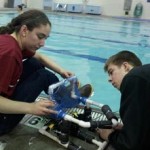
In March, educators from the Prince William Sound Science Center took their Discovery Outreach programs on the road to Kodiak and Valdez. They worked with high school and middle school students, teaching them about remotely operated vehicles, known as ROVs, and the challenges these vehicles face operating in Arctic ecosystems.
An ROV is a tethered underwater robot that can be operated from a boat or from shore. It is a valuable tool for exploring the ocean where it is either too dangerous or expensive for human divers. These vehicles can be used for a wide variety of tasks, including exploring shipwrecks, discovering deep sea animals and assisting with oil spill cleanups.
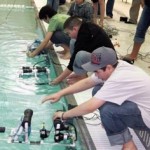
The students learned about the difficulties of operating in the Arctic environment, where hazards include incredibly harsh winters, extended periods of darkness and often unpredictable icepacks. Students then designed and built their own vehicle to respond to a mock oil spill. After splitting into “companies,” each group was given a bag of parts and a controller with three motors. The groups were free to build their own design with only a few restrictions.
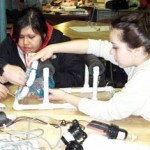
After building their vehicles, the students migrated to the pool, where the groups tested the buoyancy and balance of their machines. After some adjustments, students were ready to tackle the mock oil spill. The vehicles completed mock tasks such as transporting floating equipment by bringing a beach ball back to the side of the pool, delivering a piece of equipment to an underwater work station by driving through a submerged hula hoop, and taking a sample from a pool of oil in the ice by surfacing the vehicle inside a floating hula hoop. Students got competitive as they raced against the clock, trying to complete as many challenges as possible within the time limit. Groups also received points for good teamwork.
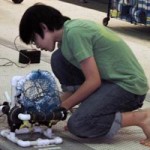
One of the most remarkable things was the wide variety of solutions the students came up with. No two vehicles were the same. All of the groups developed different strategies to accomplish the challenges as they were forced to think about new design and engineering problems. The students learned about new forms of technology and how they are being used, while having fun building and testing their own machine.
Students learned cooperation, innovation, communication and other skills which are essential for success in the 21st century. The Prince William Sound Science Center’s Discovery Outreach programs bring these hands-on experiences to communities around Alaska. Students involved with these programs develop into the future’s workforce and problem solvers, able to respond to the challenges of threatened natural resources.
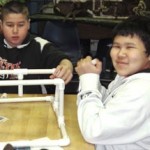
This outreach program was co-sponsored by the Oil Spill Recovery Institute and the council.
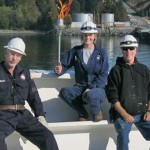
A 2010 graduate of Valdez High School, Kathryn “Katie” Miller, was chosen to sail with Polar Tankers, Inc. as a deck officer cadet last fall.
During her 90 day tour, Miller learned about navigation, seamanship and cargo handling operations. Her experiences helped satisfy her requirements to become a person–in-charge of loading and discharging cargoes on tank ships and she acquired sea time needed to obtain her United States Coast Guard license upon graduation.
“We do a presentation for the Valdez High School Marine Tech class every year to let the students know of the opportunities in the marine field,” said Monty Morgan, Marine Superintendent for Polar Tankers in Valdez.
“Maritime academies offer a wide range of degrees, from international trade to sea going careers, and are often not utilized enough by Alaska students. Hopefully, Katie’s return to Valdez will generate more interest by the future graduates of Valdez High about careers in shipping,” said Morgan.
Miller is the first Valdez High School graduate to participate in this program. She returned to school at the United States Merchant Marine Academy in Kings Point, NY in November.
By ALICIA ZORZETTO
Council Digital Collections Librarian
Five council staff members participated in U.S. Coast Guard sponsored training on how to manage emergencies such as oil spills. The training events took place in late March and early April.
The training focused on the Incident Command System, a standardized emergency management structure first developed in the early 1970’s to manage rapidly moving wildfires, later adopted to manage all types of emergencies and incidents.
During an oil spill, this management system provides the framework for federal, state and local representatives to work with the spiller, and other resource providers, to respond in a highly organized and somewhat standardized manner.
Council staff along with other attendees from the government and private industry reviewed the basic incident command system principles used to manage an effective response to an incident.
Learn more: What is an Incident Command System or Unified Command?